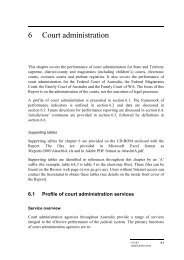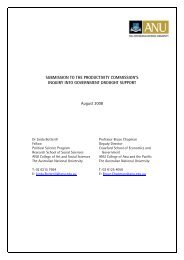Innovation & Business Skills Australia - Productivity Commission
Innovation & Business Skills Australia - Productivity Commission
Innovation & Business Skills Australia - Productivity Commission
You also want an ePaper? Increase the reach of your titles
YUMPU automatically turns print PDFs into web optimized ePapers that Google loves.
• Creativity and design/innovation<br />
• Converging technologies – including combinations of business, IT and<br />
creative skills<br />
• Advanced computer and IT skills<br />
(IBSA, Environment Scan 2010 - Education Industry page 16)<br />
IBSA agrees with the <strong>Commission</strong>’s paper that managerial, entrepreneurial and<br />
marketing skills, already present to some extent in the VET sector, will need to be<br />
increased and held by a greater proportion of VET professionals.<br />
While it is difficult to accurately determine the size of the VET workforce, it is likely<br />
that an increase in the numbers of VET practitioners/professionals will be required to<br />
meet this likely increase in demand.<br />
It is also likely that higher level qualifications will grow as the sort of economy wide<br />
changes outlined in the <strong>Commission</strong>’s paper emerge more strongly. These may<br />
include degrees and other higher education qualifications, but are more likely to<br />
involve a greater number and range of higher level VET qualifications. A number of<br />
Industry <strong>Skills</strong> Councils, including IBSA, have developed Vocational Graduate<br />
Certificates and Diplomas in a number of fields. Because these qualifications are<br />
competency based, and therefore enable the recognition of prior learning (RPL), they<br />
represent very effective professional development instruments. For example, they<br />
enable VET practitioners who may hold lower level qualifications but have strong<br />
experience in VET management to obtain recognition towards IBSA’s Vocational<br />
Graduate Certificate in Management (Learning), while undertaking an appropriate<br />
learning program to gain the remainder of the qualification. What is more, some of<br />
this learning, assessment and recognition could be obtained on the job.<br />
This example highlights the greater flexibility of VET qualifications over similar higher<br />
education qualifications, which seldom define the workplace standard required with<br />
any specificity, seldom enable RPL and only rarely, and only at some institutions,<br />
provide for on the job learning.<br />
In addition, notwithstanding the difficulties outlined above, Industry <strong>Skills</strong> Councils<br />
are keen to build articulation bridges to higher education qualifications as much as<br />
possible.<br />
IBSA proposes a greater emphasis on supporting the development of higher level<br />
qualifications and the provision of greater support from employers to increase<br />
opportunities to gain such qualifications by VET practitioners/professionals.<br />
The issue of Training Packages, as raised in the paper is not the relevant one. The<br />
real issue is competency based training and we have already argued in the<br />
paragraphs above that the competency based approach is just as applicable to<br />
higher level qualifications as to lower level qualifications.<br />
IBSA is aware of the views of some people and groups who have campaigned<br />
against competency based training since its inception nearly twenty years ago. The<br />
<strong>Commission</strong> would be also aware that the reason for the adoption of the competency<br />
based approach was because industry, defined as both unions and employers,<br />
believed that its needs were not being met by a system of industry training which<br />
largely ignored the needs of the end users of that training. Industry perceived that<br />
7

















